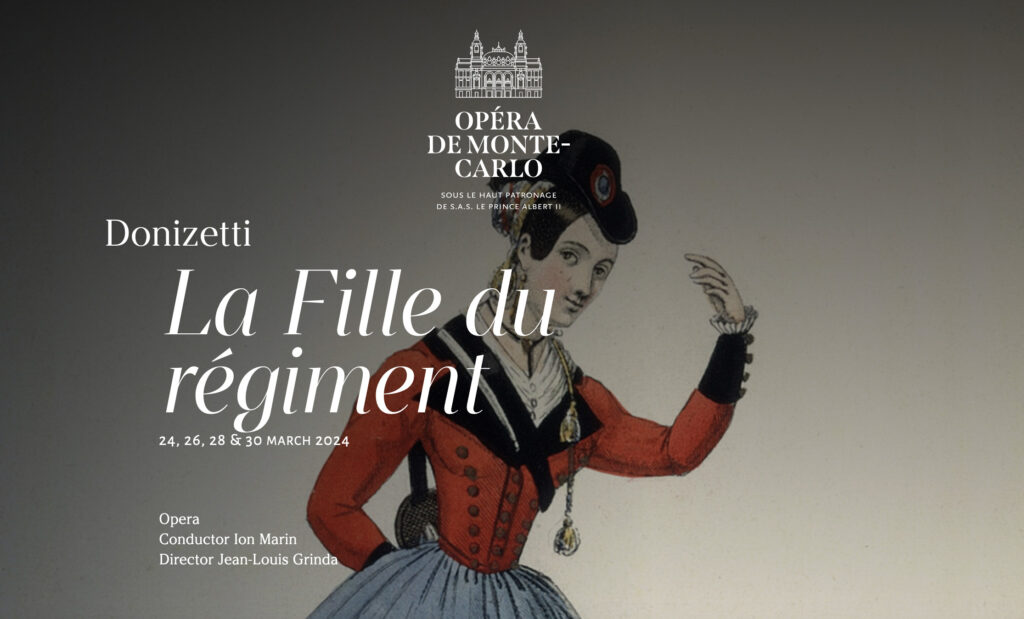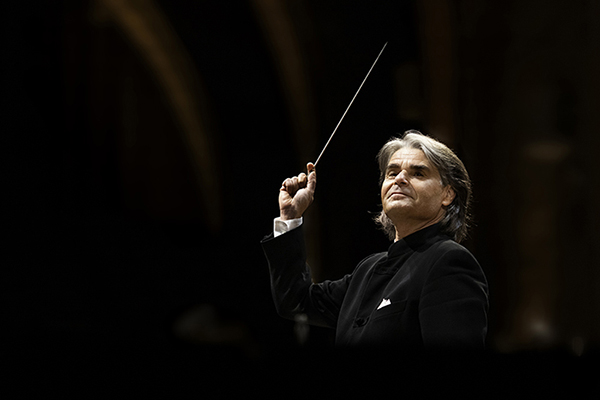Light-hearted and frivolous, La Fille du regiment is one of Gaetano Donizetti’s major works, which Monte-Carlo Opera stages this week. With a cast headed by soprano Regula Mühlemann and tenor Javier Camarena, this new production for the Company is directed by Jean-Louis Grinda, and led by conductor Ion Marin.
As the operatic world moved from Rossini to Verdi, it was Donizetti who filled the gap, with operas such as Lucia di Lammermoor written in 1835, La Fille du régiment in 1840 and La favorite, also written in 1840. The libretto for the two-act La Fille du régiment was written by Jules Henry Vernoy de Saint-Georges and Jean-François Bayard. The opera premiered at the Opéra-Comique in Paris, on 11th February, 1840, and despite its popularity, the opera received mixed reviews.
When it was adapted for Italian theatres, certain changes were made. It was popular at the time for sopranos to bask in the glory of spectacular vocal parts, and in cutting the role of Tonio, La figlia del regimento was very successful, even though it lost some of its lustre. It wasn’t until the mid 1960s that Tonio’s arias were reinstated when the opera was staged at Covent Garden, and a young tenor by the name of Luciano Pavarotti rose to international stardom. Since then, it has become necessary not only for a first-class soprano to star as Marie, but also for a fine tenor to take the role of Tonio.
The story of La fille du régiment tells of Marie who was found on a battlefield, and was raised as the ‘daughter’ of the 21st Regiment. Although her foster-father Sulpice decided that Marie had to marry a soldier from the Regiment, Marie fell in love with a Tyrolean peasant, Tonio.
Caught up in the conflict between the French and Austrians, the Marquise de Berkenfield and her steward Hortensius come across the Regiment. The Marquise claims to be Marie’s aunt and, in order to provide the girl with a proper education and to fulfil her plans for Marie to marry Duke Scipio of Crakentorp, the Marquise forces Marie to leave not only her Regiment, but Tonio as well – who has enlisted so that he can marry her. The Regiment rushes in to see Marie and when the Marquise refuses to allow Tonio to marry Marie, he reveals that he knows that Marie is the Marquise’s illegitimate daughter. When Marie learns that the Marquise is in fact her mother, she agrees to marry the Duke, but is prevented from doing so by the Regiment. The Marquise ultimately decides that she cannot make her daughter unhappy, and gives her permission for Marie and Tonio to marry.
Following a recent recording of Mozart’s arias, Swiss soprano Regula Mühlemann has what BBC Music Magazine described as a voice that is “…. gently luminous and true in pitch, her singing of a scale ideal for this acoustic – yet she can pack an emotional punch”. She most recently appeared in Strauss’ Die Fledermaus at Vienna State Opera, in Orff’s Carmina Burana at Théâtre des Champs-Élysées and in Brahms’ Ein Deutsches Requiem at Opéra de Monte-Carlo, Philharmonie de Paris, Tonhalle Zürich and the Konzerthaus Dortmund. Scheduled future performances include concerts in Bern and Lucerne, in recital at Carnegie Hall, and in Mozart’s Mass in C minor in Salzburg.
Bass-baritone Jean-François Lapointe takes the role of Marie’s foster-father, Sulpice. He has appeared on major European stages such as those in Paris, Vienna, Zurich, Barcelona, Madrid, Lisbon, Frankfurt, Berlin and Liège, as well as in America and Japan. He also regularly appears in concert, singing melodies as well as oratorios. Among his favorite parts is the title role in Debussy’s Pelléas et Mélisande, which he has performed at the Opéra Royal de Wallonie, the Théâtre des Champs-Elysées, the Concertgebouw in Amsterdam and more recently at Teatro alla Scala, Milan.
Mexican tenor Javier Camarena was recently honoured by the prestigious International Opera Awards as Male Singer of the Year. Future performances include those at the Opera Gala at Gran Teatre del Liceu in Barcelona, as Don Ramiro in Rossini’s La Cenerentola at Teatro dell Opera di Roma and also in Barcelona, and the Duke of Mantua in Verdi’s Rigoletto at Lyric Opera of Chicago. Following the Metropolitan Opera’s production of L’Elisir d’Amore, the Observer wrote that it “… features the Mexican tenor at his absolute finest”.
Mezzo-soprano Marie Gautrot is the Marquise de Berkenfield. She has appeared in many of the major opera houses in France, including the Théâtre des Champs Elysées and the Opéra National de Paris. Ms Gautrot has most recently seen with the Opéra Royal de Wallonie – Liège in Montpellier as Madame de Quimper-karadec in Offenbach’s La vie parisienne, and A Night at the Café-concert in Palazzetto Bru Zane in Italy. Following her appearance in Offenbach’s The Fairies of the Rhine, Opera magazine wrote: “Here is a real dramatic mezzo voice, as the French repertoire needs it: hot, striking in the high, sound in the bass, capable of vehemence as well as softness”.
Also in the cast are Rudolph Briand as Hortensius, Jean-François Vinciguerra as Scipio, Benoît Gunalons is the notary and Nicolo La Farcical is a farmer.
Ion Marin is one of few conductors to lead major symphonic and operatic orchestras. He has conducted nearly all the great European orchestras, including the Berliner Philharmoniker, Gewandhausorchester Leipzig, London Symphony Orchestra, Philharmonia Orchestra, Orchestre national de France, Orchestra dell’Accademia Nazionale di Santa Cecilia and St Petersburg Philharmonic. He also appears regularly as conductor of the NHK Symphony and Tokyo Metropolitan Symphony Orchestra in Japan, and is a frequent guest at the world’s major opera houses, including the Metropolitan Opera, Teatro alla Scala, Deutsche Oper Berlin, Bayerische Staatsoper and Opéra national de Paris.
Maestro Marin leads the soloists, the Chorus of the Monte-Carlo Opera (Director Stefano Visconti) and the Monte-Carlo Philharmonic Orchestra in four performances of La Fille du régiment between 24th and 30th March. For further information and details of ticketing, visit the Monte-Carlo Opera website.
Information sourced from:
Monte-Carlo Opera programme notes
Artists’ websites




